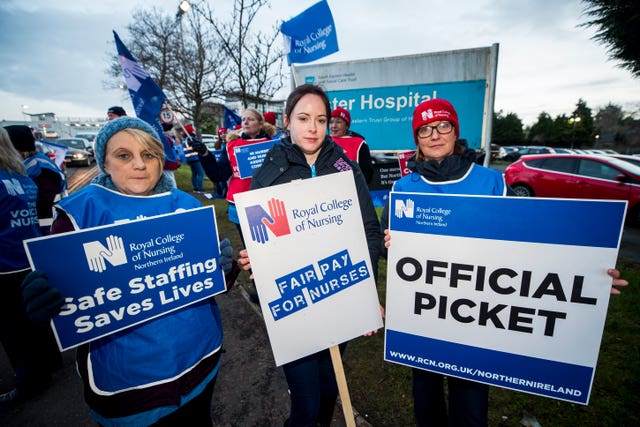Thousands of “burned out” nurses have taken to picket lines in the north of Ireland as one-day strike action brings some health services to a standstill.
An escalating row over pay and conditions in the under-pressure hospital system emptied treatment waiting rooms across the country.
Politicians are trying to reach an agreement which would produce a funding boost for an NHS beset by long waiting lists for treatment and rancour over employee pay levels while struggling to fill some vacant posts.
The Royal College of Nursing (RCN) protest follows a similar walkout last month over salary rates that lag behind colleagues in Great Britain and staff shortages.
Absolute pleasure to be with our nurses at the Ulster Hospital picket line. So proud of our profession. https://t.co/zNOR3NaIUs
— pat cullen (@patcullen9) January 8, 2020
Lyndsay Thomson, 30, from Bangor in Co Down, who works as a staff nurse in anaesthetics at the Ulster Hospital, said: “We cannot retain or recruit staff and staff are just at the point of burn-out.”
Anne Waterman, 60, a staff nurse from Belfast involved in day procedures at the same hospital, joined a picket line and added: “I know people hear us but we really need to be listened to and we don’t know what else to do at the minute other than this.”
More than 2,000 appointments and procedures have been cancelled due to the walkout, including several Caesarean operations.
Talks broke down without agreement in December, when unions rejected a 3.1% pay offer due to their demand for pay parity with the rest of the UK.

Waterman called for action from Stormont’s political leaders, who have so far failed to restore devolved powersharing, saying “politicians here really have to step up to the mark, speak up for us and support us because we do not know what else to do”.
The RCN took strike action on Wednesday and Friday, while members of Unison (the largest health workers’ union in the north of Ireland) will stage walkouts on Friday.
The country has some of the longest waiting lists for treatment in the UK, and political paralysis at Stormont has hampered efforts to address problems.
@RCN_NI support from the nursing family at the Ulster hospital #safestaffingsaveslives @fcarrollrcn @patcullen9 @LynzThomson pic.twitter.com/7KrYRMxN5a
— Karen millen👩🔧🤱🏋️♂️ (@Karenbowes) January 8, 2020
Thomson said nurses have reached breaking point.
“Patient safety is being put at risk every day and nurses have said that enough is enough,” she added.
Seamus McGoran, interim chief executive of the South Eastern Health and Social Care Trust which delivers services in Co Down, said a new powersharing Executive can deliver on pay parity.
He added: “We’re having to prioritise our most urgent patients and, for example, those who are waiting for planned care, those numbers are getting bigger and the lengths of waits is getting longer, so we really need political leadership.
“We need long-term investment and we need a workforce plan that will deliver more sustainable staffing levels for many years to come.”


















